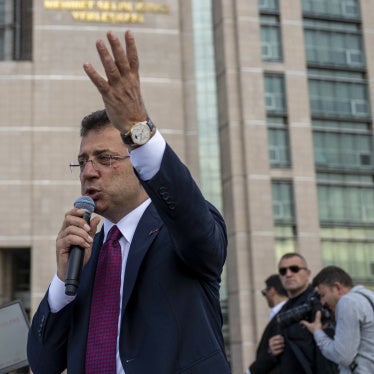I have given up trying to write a remembrance for the 368 people who died in the shipwreck off Lampedusa, a southern Italian island, one year ago. Words to honor their bravery, remember their plight, and comfort their loved ones... I am not eloquent enough, and the images of rows of coffins, including tiny child-sized ones, strangle my thoughts. Others will give speeches on this anniversary.
Those who died were desperately attempting to reach Europe from North Africa by crossing the Mediterranean. Forty-three survivors and family members of victims are on Lampedusa for commemorations. The Comitato 3 ottobre, a nonprofit association, raised the money to bring survivors from other EU countries where they now live.
Fanus, a young Eritrean woman who has since been granted asylum in Sweden, will be there. Her experience—a harrowing journey, mishandled reception in Italy, and desperate efforts to get to northern Europe—are all too common. Martin Schulz, the president of the European Parliament; Federica Mogherini, Italian foreign minister and incoming EU foreign affairs chief; Laura Boldrini, president of the Italian lower house of parliament; and Angelino Alfano, the Italian interior minister, will be there too.
In response to this tragedy, one year ago, the European Commission and EU member states promised to do more to prevent deaths at sea. A task force was set up, meetings were held. But it was Italy, on its own, that launched a massive naval search and rescue operation, Mare Nostrum, that has since brought over 91,000 people safely to shore. Despite this effort, over 3,000 women, men, and children have drowned in the Mediterranean since January.
Now, Italy plans to end Mare Nostrum in November, while the EU border agency Frontex solicits funds and equipment from other EU countries for a much more limited operation, whose primary goal is border enforcement, not saving lives.
I am confident that the members of the Comitato 3 ottobre will help the survivors through this difficult day. I hope the dignitaries on Lampedusa find the right words for their speeches.
But the most important way Europe should honor all those who have died trying to reach its borders is with concrete action. First and foremost, EU countries should equip Frontex with the necessary resources and mandate to protect lives at sea, including in international waters. Until that happens, Italy should continue Mare Nostrum.
The EU should also act to create safe, legal channels for migrants and asylum seekers, as outgoing and incoming EU commissioners have proposed. There is no shortage of ideas, including increasing the currently paltry refugee resettlement programs, issuing humanitarian visas, allowing asylum applications at embassies and opening up legal migration channels for all types of workers.
October 3rd is one of far too many anniversaries of watery deaths off European shores. Only a steadfast, genuine, and above all EU-wide commitment will prevent more.








